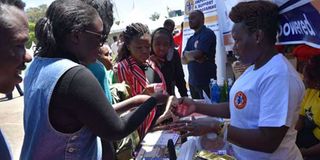Kenyan youth ranked 3rd in new HIV cases in East and Central Africa

Young people at a stand during the 2017 World Aids Day at the University of Nairobi on December 1, 2017. PHOTO | ANTHONY OMUYA | NATION MEDIA GROUP
What you need to know:
- There are 238,987 young people between the ages of 15 to 24 years living with HIV.
- Only 48.5 percent of the total population of the youth between 15 and 19 years have been tested.
- Dr Jacobi asked the youth to encourage HIV positive colleagues to seek treatment.
- According to NACC figures, there were 24,187 new infections and 4,234 deaths due to HIV-related complications in 2016.
Kenya has been ranked third in the highest new HIV infections among young people in the East and Central African region.
It is also has the second highest population of young people living with HIV/Aids.
According to statistics from the National Aids Control Council (NACC), there are 238,987 young people between the ages of 15 to 24 years living with HIV.
These form more than 20 percent of the over 1.1 million people currently on anti-retroviral therapy countrywide.
Only 48.5 percent of the total population of the youth between 15 and 19 years have been tested, with 84.8 per cent of those between 20 to 24 years so far tested.
WORLD AIDS DAY
UNAids Director Jantine Jacobi made these revelations Friday when she spoke during celebrations held at the University of Nairobi to mark the World Aids Day.
Dr Jacobi said the country needs to focus on young people in an effort to stem the tide of the pandemic.
The UN official also lamented the high number of deaths despite availability of drugs for managing the condition which are provided free of charge in public hospitals.
“We need to focus our efforts on young people but those efforts will only be successful if prevention efforts are led by young people. Sadly, the high number of Aids-related deaths is a concern as they occur despite the availability of anti-retroviral therapy countrywide,” said Dr Jacobi.
According to figures released by NACC, there were 24,187 new infections and 4,234 deaths due to HIV-related complications in 2016.
Dr Jacobi asked the youth to encourage HIV positive colleagues to seek treatment.
EMPOWER YOUTH
She rooted for economic empowerment of the youth, saying it would contribute to the establishment of a prosperous and peaceful nation. She also reaffirmed the UN’s commitment to defeating the HIV scourge.
“The UN remains committed to working with the Kenyan government to ensure that HIV services are provided…[without]…stigma and discrimination. Working together with young people, we will end the Aids menace,” she said.
She said young women are the worst affected in the country due to lack of information and services and also due to discrimination.
US President's Emergency Plan for AIDS Relief (PEPFAR) Country Coordinator, Dr Tamuu Daniels, said his government has allocated over USD30 million (Sh3 billion) for assisting young girls to stay in school, giving the youth a voice on issues affecting them, changing retrogressive gender norms and empowering peer leaders.
YOUNG WOMEN
“Youths, especially young women, bear the brunt of the HIV epidemic due to limited access to information, preventive, curative and counselling services, stigma and discrimination and if it is left unchecked, there is a threat to the great strides in controlling its spread [which] we have made so far. Guaranteeing the rights and empowerment of youth is a moral obligation and a smart investment that will safeguard their health and future,” the US official said.
Dr Daniels said the country could not hope to defeat the scourge without giving young people a voice to express and empower themselves and their peers.
Ms Maureen Murenga, the chairperson of the Network of People Living with HIV in Kenya (Nephak), called on Kenyans to stop stigmatising those living with the virus.
Ms Murenga lamented that most of the deaths of HIV positive people could have been prevented had the individuals not been subjected to stigma and discrimination.





